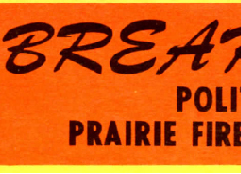Prarie Fire Organizing Committee (PFOC)
An anti-imperialist group that began as the Prairie Fire Distributing Committee in 1974 to distribute Prairie Fire: The Politics of Revolutionary Anti-Imperialism,
written by members of the Weather Underground Organization. After its
initial publication, groups sprang up around the country to discuss the
book. PFOC was formally organized in 1976 and was active in the San
Francisco Bay Area, Los Angeles, and Chicago until the mid-1990s. Their
work embraced a broad range of issues: international solidarity with
national liberation struggles in Zimbabwe, Namibia, South Africa,
Nicaragua and El Salvador; and with the struggles for self-determination
of Puerto Rican, African-American, Mexicano, and Native peoples inside
U.S. borders; support of political prisoners; opposition to white and
male supremacy and support of women’s and gay liberation.
Subcollections
-
Breakthrough
Breakthrough was the journal of the Prairie Fire Organizing Committee (PFOC), published by the John Brown Book Club from 1977 to 1995.
Documents
2 Documents Found
 Breakthrough
Breakthrough
Publisher: Prarie Fire Organizing CommitteeYear: 1982Volume Number: Vol. 6-1 SpringFormat: PeriodicalCollection: Breakthrough
Editorial: Defend the October 20th Freedom Fighters! P. 1 - Editorial: Palestine Will Be Free! P. 8 - Building Strategic Alliances:National Liberation inside the U.S. Imperialist State, Ahmed Obafemi, Natl Committee to Defend New Afrikan Freedom Fighters p. 17 - They are watching Assata's Daughter (poem) p. 24 - Mexico and Revolution in the Americas p. 26 - Lessons of Lares, Jose Lopez, Natl Coordinator, Movimiento de Liberacion Nacional p. 33 - "We Are a Nation at War" Interview with NAPO p. 43 - Build the National Conference Against Repression and Fascism, Denver (inside back cover)
 Breakthrough
Breakthrough
Publisher: Prarie Fire Organizing CommitteeYear: 1988Volume Number: Vol. 12-1 SummerFormat: PeriodicalCollection: Breakthrough
Editorial: The Uprising p. 1 - What Happens to a Dream Deferred? Felix Shafer P. 3 - No Justice, No Peace: the Black Liberation Movement 1968-1988 Interview with Chokwe Lumumba, Chairman, New Afrikan People's Organization p. 8 -Interiew with Kwame Ture, All-African People's Revolutionary Party p. 9 - Free the Sharpeville Six p. 17 - Lesbian Mothers: Rozzie and Harriet Raise a Family, Judy Gerber with Leslie Mullen p. 26 - Revising the 60s, review of Todd Gitlin's The Sixties: Years of Hope, Days of Rag, Robert Roth and Nancy Kurshan p. 33 - Behind the U.S. Economic Decline, Julio Rosado, Movimiento de Liberacin Nacional Puertorriqueno p. 38 - Can't Kill the Spirit: Political Prisoners and POWs Update p. 46 - Write Through the Walls p. 50
2 Documents Found


